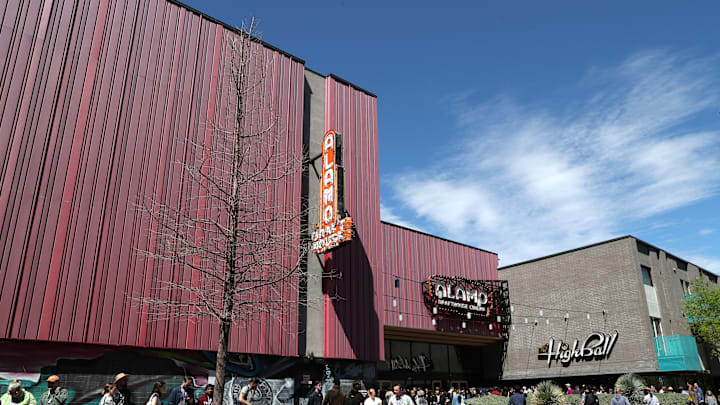In 1948, the Supreme Court ruled 7-1 in favor of the idea that movie studios could no longer own movie theaters. This practice had been going on for decades and included studios engaging in extreme forms of "block booking" (forcing theaters to buy multiple films at once). With the United States v. Paramount Pictures, Inc. case, though, a business monopoly was shattered. Shady business dealings from studios were not automatically wiped out by this decision. However, movie theaters suddenly had more flexibility in what they could play. There was actual competition in the theatrical landscape. Audiences had more options on the big screen, including independent titles that finally had access to theatrical screens. The benefits of upholding the Paramount Decree (which solidified that film studios could no longer purchase and run exhibition entities)
That landmark decision was repealed in 2020 and paved the way for today's massive news. Sony Pictures Entertainment has purchased the Alamo Drafthouse Cinema chain. The exhibition chain has experienced many financial challenges in recent years, which included closing several Dallas/Fort Worth locations over the first week of June 2024. Now, this theater will have money from a tech giant and be part of a new division within the Sony empire called Sony Pictures Experiences. That label and the Alamo Drafthouse division will be led by current Alamo CEO Michael Kustermann. In announcing this new, Tom Rothman, chairman and CEO of Sony Pictures Motion Picture Group, made the following statement:
"“Alamo Drafthouse has always held the craft of filmmaking and the theatrical experience in high esteem, which are fundamental shared values between our companies. I’m jazzed that our company is doing this.”"Tom Rothman
For decades, big media figures had championed the Paramount Decree getting entirely wiped out under the notion that the ruling no longer made sense in a modern media landscape. Such sentiments always seemed foolhardy and came off as especially out of touch with reality as the 2010s went on. As more and more conglomerates merged (namely Disney and 20th Century Fox), thus reducing competition in the marketplace significantly, it was clear the American film industry needed more anti-trust legislation than ever before. How on Earth did it make sense that conglomerates couldn't own multiple broadcast networks but they could purchase as many streaming services as they liked?
The free rein given to major American companies extended to the dismantling of the Paramount Decree in 2020 without any new safeguards established to keep studios from stepping into the theatrical exhibition space. It was totally possible for the nightmare landscape of pre-1948 American cinema to come roaring back for the age of streaming and music biopics. Before June 2024, no studios entered the exhibition space, potentially out of fear of legislative retaliation. The closest thing we've seen to modern movie studios getting into the movie theater game is Netflix and Amazon each operating a handful of theaters (the latter company currently only operates one such location). Now, Sony has purchased all 35 Alamo Drafthouse theaters, a major seal-breaker in the history of American cinema.
True, Sony purchasing 35 theaters isn't the same thing as, say, Disney buying AMC or Warner Bros. owning Cinemark. However, that's still an entire chain of movie theaters under the ownership of a media conglomerate that also owns a massive movie studio. The mind reels at the negative outcomes of such ownership. Will Alamo Drafthouse locations now prioritize movies from Sony-owned studios like Columbia Pictures and Sony Pictures Classics above all other studios? Will consumers have fewer options than ever in where and what they can watch on the big screen? What jobs could be potentially cut to make this new business "profitable" for Sony?
The fear of Sony just getting warmed up in the world of theatrical exhibition is also deeply worrisome. Does that Sony Pictures Experiences label indicate that this conglomerate is out to purchase other movie theater chains too? Will Studio Movie Grill get sucked into the belly of the beast? Will Malco Theater chains become another arm of the Sony conglomerate? What if other studios join in and begin plucking up movie theater chains? The simultaneous destruction of the Paramount Decree and the challenged financial status of many movie theater chains has created a terrible confluence of circumstances. Big-screen exhibitors are vulnerable. Movie studios can legally buy theaters again. None of this bodes well for cinema as an artform or for consumers. Paired with the recent loss of independent theaters like the Angelika Plano, the future for exhibition looks unfortunately bleak.
What's fascinating about this is, in a vacuum, Sony probably will treat Alamo Drafthouse fine. The studio's been openly and actively committed to theatrical distribution. It's doubtful the conglomerate is seeking out this label just to strip it for parts. But even a "good" movie studio owner of an exhibition chain is still a movie studio owner of an exhibition chain. Historical precedent shows that studios should not also own the establishments projecting their movies. It doesn't end well. There's a reason the Paramount Decree existed for nearly 80 years. With Sony purchasing all 35 Alamo Drafthouse locations, we all may get to live through a chain of events vividly reminding us why that anti-monopoly act was needed in the first place.
